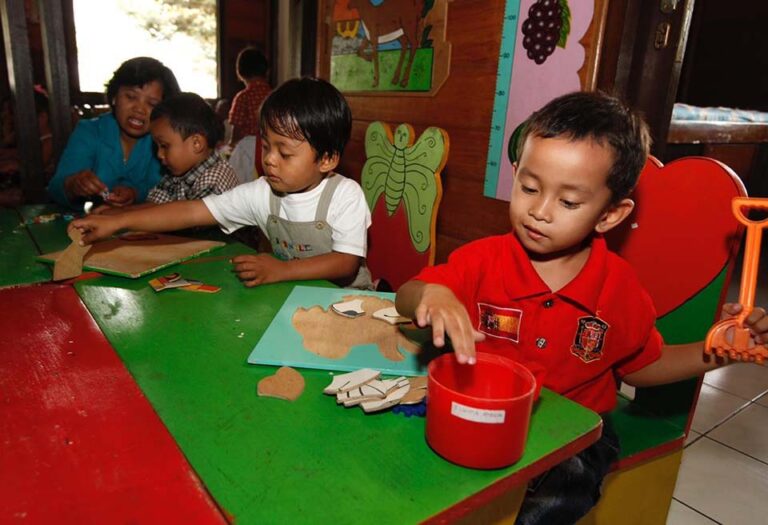July 4, 2024
Jakarta – The recent United Nations report on the learning crisis facing low- and middle-income countries around the world has raised concerns about the state of early childhood education in Indonesia, which appears to be lagging behind its neighbouring countries.
The report, produced by UNICEF in collaboration with UNESCO, highlights the importance of early childhood care and education (ECCE) to promote, among other things, school readiness and lifelong well-being.
Yet nearly 60% of children in low-income countries lack access to early learning opportunities, the report says. As a result, more than 300 million children worldwide will not achieve minimum levels of reading proficiency by 2030 if immediate action is not taken.
The UN has highlighted that ECCE is the most transformative investment a country can make to give all children a fair start in life and tackle inequalities from the beginning.
“Investing in our youngest children brings the best returns, both socially and economically. […] “The price of inaction can be very high, as our work shows,” said UNESCO’s Stefania Giannini at the launch of the report on June 17, as stated in an official statement.
Read also: Madura minor’s betrothal renews call to end child marriage
The report also reveals that around 43% of preschool teachers worldwide do not have the necessary training, estimating that the world would need an additional six million preschool teachers by 2030 to achieve the Sustainable Development Goal (SDG) of ensuring quality early education for all children.
Furthermore, the report states that education and child protection are severely underfunded in most countries. Globally, an additional $21 billion is needed to close the funding gap and ensure that children in all Member States can access one year of free pre-primary education.
The report lists nine recommendations to help countries get back on track to meet their early childhood education goals, including calling on them to allocate 10% of their education budget to ECCE.
Beyond simply throwing money at the problem, governments are also being encouraged to implement more comprehensive policies around ECCE, such as parent support programmes and the recruitment and training of preschool teachers.
Early Childhood Education in Indonesia
Data from the Indonesian Statistics Agency (BPS) showed that only 36.36 percent of the country’s children attended preschools last year, although the participation figure is still slightly up from 35.28 percent in 2022.
This puts Indonesia far behind the regional average, as UNICEF data suggests that in East and Southeast Asia in 2022, an average of 80% of children were enrolled in preschools a year before the official primary school age.
Read also: Parents and observers denounce recurring problems with school zoning policy
However, the administration of President Joko “Jokowi” Widodo has in recent years made greater efforts to develop the ECCE sector, with the country hosting the Southeast Asia Policy Dialogue on ECCE in July last year, during Indonesia’s ASEAN chairmanship.
The dialogue concluded with a Leaders’ Declaration in which Member States agreed to develop affordable, accessible and high-quality ECCE while progressively allocating larger percentages of a country’s education expenditure to this sector.
Make it mandatory
The Executive Director of the Center for Education and Policy Studies (PSPK), Nisa Felicia, said The Jakarta Post As of Monday, the Indonesian government is still too reliant on the private sector to run ECCE, with only about four percent of preschools being state-owned, according to a PSPK report from January this year.
This has made school fees more expensive, which in turn increases the gap in enrolment rates between children from rich and poor families.
This situation is reflected in the UN report: only 55% of children aged 36 to 59 months growing up in the poorest households have satisfactory development, compared to 78% of children from the richest households.
Read also: Combating learning poverty in a country struggling with real poverty
Nisa also revealed a wide disparity in quality among preschools in the country. Nearly half of preschools are not accredited and less than 5% of them receive the best accreditation.
“The poor quality of nursery schools means that [our education system] failed to prepare children to study in primary school, and thus their ability to learn at later levels [of schooling] “Prices will also be negatively impacted,” Nisa said.
She urged the government to increase the country’s compulsory schooling period to 13 years to include early childhood education. “If there is a law [making early childhood education compulsory]”The government will have to take more measures to provide better access to quality preschools.”
The government had previously attempted to extend compulsory schooling to 13 through the Education Omnibus Bill. But the bill was shelved in September 2022 after failing to garner enough support in the House of Representatives.


